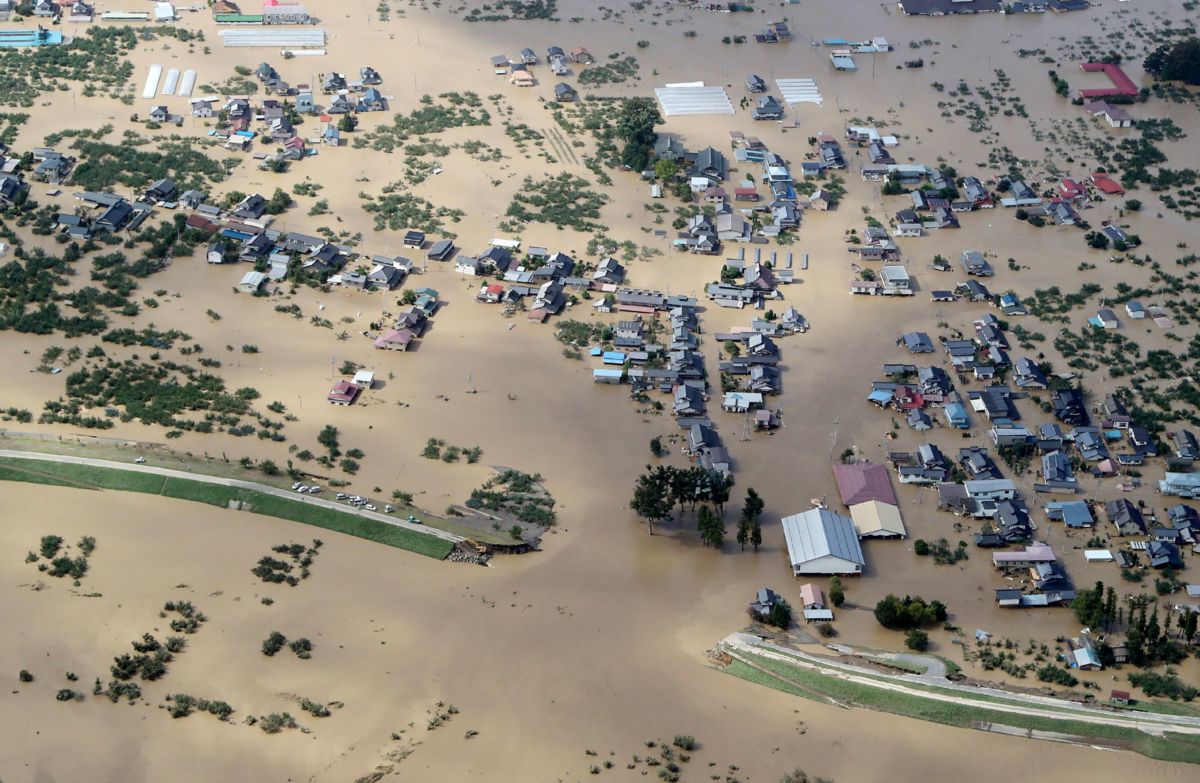Rescue operations were underway Sunday in Tokyo and several other prefectures in Japan that were battered by powerful winds and heavy rains from the deadly Typhoon Hagibis, which made landfall south of Tokyo Saturday.
“Hagibis, the 19th named storm of the season, tore through Japan’s main island of Honshu on Saturday and early Sunday packing winds of up to 144 kph at landfall, killing 35 and leaving 17 unaccounted for as of Sunday afternoon,” reported The Japan Times.
Deaths have been documented in Miyagi, Kanagawa, Tochigi, Gunma, Fukushima, Saitama, Iwate, Nagano, Ibaraki, Chiba and Shizuoka prefectures, according to public broadcaster NHK, which reported that at least 177 people suffered injuries because of the strong storm.
The environmental group 350 East Asia shared NHK footage of the destruction on Twitter and asked, “How many more extreme weather events like this should happen til all governments & corporations act seriously on the #climatebreakdown?”
How many more extreme weather events like this should happen til all governments & corporations act seriously on the #climatebreakdown?
Our hearts go out to everyone in Japan reeling from the effects of Super Typhoon #Hagibis 😞❤️
Video via https://t.co/5mmZdrRkox pic.twitter.com/cdilRZJRYw
— 350 Asia (@350_asia) October 13, 2019
A spokesperson for the Japanese government, Chief Cabinet Secretary Yoshihideu Suga, told journalists on Sunday that “the major typhoon has caused immense damage far and wide in eastern Japan.”
“People’s lives continue to be affected by disruptions to power, water, and transportation services,” said Suga, who added that 376,000 homes lack electricity and 14,000 homes lack running water. “Relevant government organizations are doing their best to restore those services as soon as possible.”
“The government dispatched personnel ahead of the disaster to local governments. They are now cooperating with Self-Defense Force personnel in collecting information on the damage,” he said, noting that 27,000 military troops and other crews were involved in rescue efforts.
“The Tama River, which runs by Tokyo, overflowed its banks, flooding homes and other buildings in the area,” according to The Associated Press. “Authorities warned of a risk of mudslides. Among the reported deaths were those whose homes were buried in landslides. Other fatalities included people who got swept away by raging rivers.”
Citing Japan’s land ministry officials, NHK reported that due to the heavy rains brought by the typhoon, levees collapsed in at least 10 spots on nine rivers.
https://twitter.com/HirokoTabuchi/status/1183188025804808192
Japanese Prime Minister Shinzo Abe, as The Guardian noted, “held an emergency meeting and offered his support to all those affected by the disaster — the second destructive storm to hit Japan in the space of a month.”
“I extend my condolences to all those who lost their lives and offer my sympathies to all those impacted,” Abe said. “With respect to blackouts, water outage and suspension of transportation services, we will do our utmost to bring about a swift recovery. We ask the public to stay vigilant in case of landslides and other hazards.”
According to The Guardian:
The operator of the Fukushima Daiichi nuclear power plant, which was wrecked by a deadly tsunami in March 2011, reported irregular readings from sensors monitoring water at the facility.
Emi Iwasa, a spokeswoman for Tokyo Electric Power, said the storm had triggered 11 leak alerts at the plant, eight of which were confirmed as having been caused by rainwater. The utility has not confirmed if any radioactive water leaked into sea.
Away from the plant, a stretch of Fukushima was flooded, with only the rooftops of residential homes visible. Parts of nearby Miyagi prefecture were also under water.
Japan’s famous bullet trains also sustained damage from Hagibis. The Japan Times reported that 10 Hokuriku Shinkansen line trains worth ¥32.8 billion ($302.5 USD) were affected.
The rainfall from Japan's massive cyclone smashed old records; at least 26 are dead, 6 million faced evacuation orders, and even many of the famous bullet trains were wreckedhttps://t.co/ezuNOLVJyP https://t.co/YBWFa3CgiH
— Bill McKibben (@billmckibben) October 13, 2019
Ten Hokuriku Shinkansen Line trains worth ¥32.8 billion sustain damage after yard is flooded in Typhoon Hagibis https://t.co/ZeNhgMY4ZE
— The Japan Times (@japantimes) October 13, 2019
Hagibis — which means “speed” in the Philippine language Tagalog — was downgraded to a tropical storm on Sunday after meteorologists’ warnings earlier this week that it could be the strongest storm to hit Japan in over six decades.
Amid rescue operations in affected areas, Agence France-Presse reported that “Japan gave their typhoon-hit nation reason to celebrate when they edged a thrilling game with Scotland 28-21 to reach their first Rugby World Cup quarter-final on Sunday.”
“To everyone that’s suffering from the typhoon, this game was for you guys,” Japan captain Michael Leitch said of the soccer match at Yokohama International Stadium, which was nearly canceled. “It was more than just a game for us — there was talk this game may not happen — so our heart goes out to everyone that’s suffering tonight with the typhoon.”
Trump is silencing political dissent. We appeal for your support.
Progressive nonprofits are the latest target caught in Trump’s crosshairs. With the aim of eliminating political opposition, Trump and his sycophants are working to curb government funding, constrain private foundations, and even cut tax-exempt status from organizations he dislikes.
We’re concerned, because Truthout is not immune to such bad-faith attacks.
We can only resist Trump’s attacks by cultivating a strong base of support. The right-wing mediasphere is funded comfortably by billionaire owners and venture capitalist philanthropists. At Truthout, we have you.
Our fundraising campaign is over, but we fell a bit short and still need your help. Please take a meaningful action in the fight against authoritarianism: make a one-time or monthly donation to Truthout. If you have the means, please dig deep.
